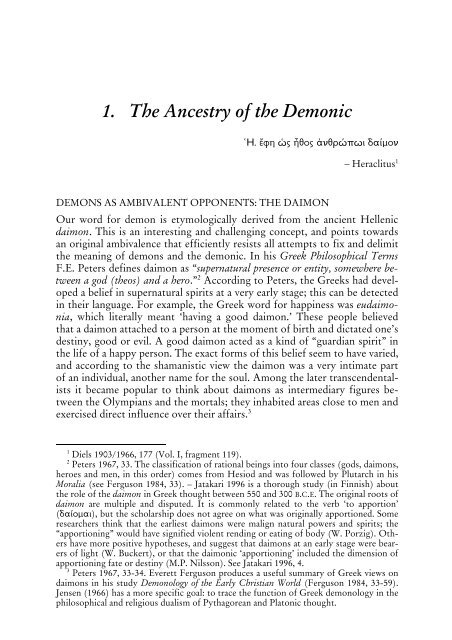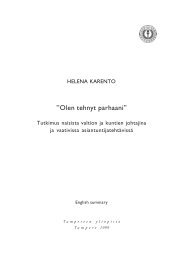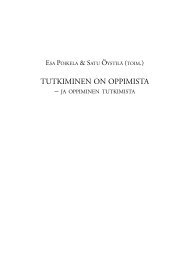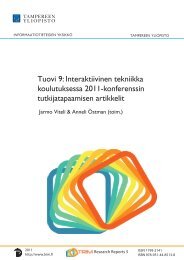Note on this edition: this is an electronic version of the 1999 book ...
Note on this edition: this is an electronic version of the 1999 book ...
Note on this edition: this is an electronic version of the 1999 book ...
Create successful ePaper yourself
Turn your PDF publications into a flip-book with our unique Google optimized e-Paper software.
1. The Ancestry <strong>of</strong> <strong>the</strong> Dem<strong>on</strong>icÑH. fh …w ∑yow ényr≈pvi da¤m<strong>on</strong>– Heraclitus 1DEMONS AS AMBIVALENT OPPONENTS: THE DAIMONOur word for dem<strong>on</strong> <strong>is</strong> etymologically derived from <strong>the</strong> <strong>an</strong>cient Hellenicdaim<strong>on</strong>. Th<strong>is</strong> <strong>is</strong> <strong>an</strong> interesting <strong>an</strong>d challenging c<strong>on</strong>cept, <strong>an</strong>d points towards<strong>an</strong> original ambivalence that efficiently res<strong>is</strong>ts all attempts to fix <strong>an</strong>d delimit<strong>the</strong> me<strong>an</strong>ing <strong>of</strong> dem<strong>on</strong>s <strong>an</strong>d <strong>the</strong> dem<strong>on</strong>ic. In h<strong>is</strong> Greek Philosophical TermsF.E. Peters defines daim<strong>on</strong> as “supernatural presence or entity, somewhere betweena god (<strong>the</strong>os) <strong>an</strong>d a hero.” 2 According to Peters, <strong>the</strong> Greeks had developeda belief in supernatural spirits at a very early stage; <strong>th<strong>is</strong></strong> c<strong>an</strong> be detectedin <strong>the</strong>ir l<strong>an</strong>guage. For example, <strong>the</strong> Greek word for happiness was eudaim<strong>on</strong>ia,which literally me<strong>an</strong>t ‘having a good daim<strong>on</strong>.’ These people believedthat a daim<strong>on</strong> attached to a pers<strong>on</strong> at <strong>the</strong> moment <strong>of</strong> birth <strong>an</strong>d dictated <strong>on</strong>e’sdestiny, good or evil. A good daim<strong>on</strong> acted as a kind <strong>of</strong> “guardi<strong>an</strong> spirit” in<strong>the</strong> life <strong>of</strong> a happy pers<strong>on</strong>. The exact forms <strong>of</strong> <strong>th<strong>is</strong></strong> belief seem to have varied,<strong>an</strong>d according to <strong>the</strong> sham<strong>an</strong><strong>is</strong>tic view <strong>the</strong> daim<strong>on</strong> was a very intimate part<strong>of</strong> <strong>an</strong> individual, <strong>an</strong>o<strong>the</strong>r name for <strong>the</strong> soul. Am<strong>on</strong>g <strong>the</strong> later tr<strong>an</strong>scendental<strong>is</strong>tsit became popular to think about daim<strong>on</strong>s as intermediary figures between<strong>the</strong> Olympi<strong>an</strong>s <strong>an</strong>d <strong>the</strong> mortals; <strong>the</strong>y inhabited areas close to men <strong>an</strong>dexerc<strong>is</strong>ed direct influence over <strong>the</strong>ir affairs. 31 Diels 1903/1966, 177 (Vol. I, fragment 119).2 Peters 1967, 33. The classificati<strong>on</strong> <strong>of</strong> rati<strong>on</strong>al beings into four classes (gods, daim<strong>on</strong>s,heroes <strong>an</strong>d men, in <strong>th<strong>is</strong></strong> order) comes from Hesiod <strong>an</strong>d was followed by Plutarch in h<strong>is</strong>Moralia (see Fergus<strong>on</strong> 1984, 33). – Jatakari 1996 <strong>is</strong> a thorough study (in Finn<strong>is</strong>h) about<strong>the</strong> role <strong>of</strong> <strong>the</strong> daim<strong>on</strong> in Greek thought between 550 <strong>an</strong>d 300 B.C.E. The original roots <strong>of</strong>daim<strong>on</strong> are multiple <strong>an</strong>d d<strong>is</strong>puted. It <strong>is</strong> comm<strong>on</strong>ly related to <strong>the</strong> verb ‘to apporti<strong>on</strong>’(da¤omai), but <strong>the</strong> scholarship does not agree <strong>on</strong> what was originally apporti<strong>on</strong>ed. Someresearchers think that <strong>the</strong> earliest daim<strong>on</strong>s were malign natural powers <strong>an</strong>d spirits; <strong>the</strong>“apporti<strong>on</strong>ing” would have signified violent rending or eating <strong>of</strong> body (W. Porzig). O<strong>the</strong>rshave more positive hypo<strong>the</strong>ses, <strong>an</strong>d suggest that daim<strong>on</strong>s at <strong>an</strong> early stage were bearers<strong>of</strong> light (W. Buckert), or that <strong>the</strong> daim<strong>on</strong>ic ‘apporti<strong>on</strong>ing’ included <strong>the</strong> dimensi<strong>on</strong> <strong>of</strong>apporti<strong>on</strong>ing fate or destiny (M.P. Nilss<strong>on</strong>). See Jatakari 1996, 4.3 Peters 1967, 33-34. Everett Fergus<strong>on</strong> produces a useful summary <strong>of</strong> Greek views <strong>on</strong>daim<strong>on</strong>s in h<strong>is</strong> study Dem<strong>on</strong>ology <strong>of</strong> <strong>the</strong> Early Chr<strong>is</strong>ti<strong>an</strong> World (Fergus<strong>on</strong> 1984, 33-59).Jensen (1966) has a more specific goal: to trace <strong>the</strong> functi<strong>on</strong> <strong>of</strong> Greek dem<strong>on</strong>ology in <strong>the</strong>philosophical <strong>an</strong>d religious dual<strong>is</strong>m <strong>of</strong> Pythagore<strong>an</strong> <strong>an</strong>d Plat<strong>on</strong>ic thought.














